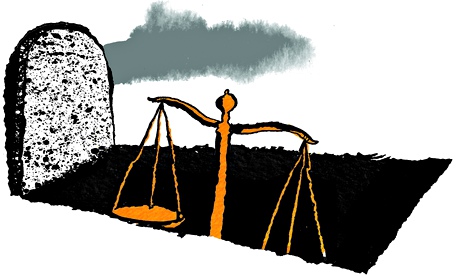Laws that cost too much to enforce are phoney laws. A civil right that people can’t afford to use is no right at all. And a society that turns justice into a luxury good is one no longer ruled by law, but by money and power. This week the highest court in the land will decide whether Britain will become such a society. There are plenty of signs that we have already gone too far.
Listen to the country’s top judge, Lord Thomas of Cwmgiedd, who admits that “our justice system has become unaffordable to most”. Look at our legal-aid system, slashed so heavily by David Cameron and Theresa May that the poor must act as their own trial lawyers, ready to be skittled by barristers in the pay of their moneyed opponents.
The latest case will be heard by seven supreme court judges and will pit the government against the trade union Unison. It will be the climax of a four-year legal battle over one of the most fundamental rights of all: the right of workers to stand up against their bosses.
In 2013, Cameron stripped workers of the right to access the employment tribunal system. Whether a pregnant woman forced out of her job, a Bangladeshi-origin guy battling racism at work, or a young graduate with disabilities getting aggro from a boss, all would now have to pay £1,200 for a chance of redress.
The number of cases taken to tribunal promptly fell off a cliff – down by 70% within a year. Citizens Advice, employment lawyers and academics practically queued up to warn that workers – especially poor workers – were getting priced out of justice. But for Conservative ministers, all was fine. Loyal flacks such as Matthew Hancock (then employment minister) claimed those deterred by the fees were merely “unscrupulous” try-ons, intent on “bullying bosses”. Follow Hancock’s logic, and with all those time-wasters weeded out, you’d expect the number of successful tribunal claims to jump. They’ve actually dropped.
At each hearing of Unison’s case, the judges have wound up asking to see actual people for whom the fees have represented a barrier to justice. One was sure that“if the statistics … were drilled down to some individual cases, situations would be revealed that showed an inability on the part of some people to proceed before an employment tribunal through lack of funds”.
Should the supreme court judges want the same thing, they could meet Liliana Almanza. They’d find her a compelling witness, although she finds it hard to sit down for too long due to three herniated discs in her lower back, which make her feel like she’s lugging around “a lot of heavy weight” and which send pain shooting into her hands, legs, shoulders and neck. She also has sometimes severe depression and anxiety. The physical pain and the mental illness can feed off each other.
Almanza has worked as a cleaner at the University of London since 2011 and never kept her conditions from her employer, an outsourcing company called Cofely. Then came a new supervisor, who Almanza felt had it in for her and who piled on extra work. Almanza was sent to the “punishment floor” – actually three floors, normally handled by two people, but she had to do the work on her own and in little time. The extra workload, especially the pushing about of a hoover and a mop, caused her so much pain that she sometimes felt dizzy. Yet when Almanza complained, she says the supervisor either laughed or told her to sign off sick. Despite being required under law, there was no adjustment for her disabilities.
Almanza, who is Colombian, remembers the supervisor telling her how Latin Americans were a bunch of beggars. Other times, she’d call Almanza a “bitch” and a “whore”.
On the worst days, Almanza would walk over to Euston station and stand at the platform’s very edge. She’d wait for the tube to come. Then “a light would come on” and she’d pull herself back.
Almanza did exactly what ministers would want and submitted a grievance using Cofely’s in-house procedure. It was rejected. She appealed and did not hear anything for months. However desperate her situation, she would never have found the money for a tribunal. Some are exempt from the fees, but Almanza and her husband – both cleaners – apparently earned too much money for her to qualify. Nor does the means-testing account for living costs, even though after renting a single room in a shared ex-council house in London and paying bills they have almost no money each month.
Her union, the tiny Independent Workers of Great Britain (IWGB), pitched in some money to go to tribunal and helped crowdfund the rest. As soon as she did, Almanza remembers that her employer made a number of adjustments and lightened her workload.
I contacted Engie, as Cofely has been rebranded, for its response to Almanza’s charges. Its statement reads in part: “We do not tolerate discrimination in the workplace and all claims … are investigated thoroughly. Following extensive investigation of the allegations brought against Cofely Workplace, all claims were denied and Cofely was formally discharged from the proceedings by the court on 24th May 2016.” The court documents actually show that Cofely was discharged because the contract was taken over by another company, which also reached a settlement with Almanza.
Without charity and the shoestring resources of the IWGB, Almanza wouldn’t have been able to file a claim. If she could testify to the supreme court, what would she say? “I would tell the judges if I hadn’t been able to go to tribunal I don’t think I’d be here today. If I’d continued like that, I wouldn’t have been able to tell this story. Maybe it sounds like an exaggeration, a movie. But it’s one thing to talk about it, another thing to live it.”




 Convinced
that the overwhelming weight of evidence favors a
negative verdict if the ICJ ever braved such an
initiative, ElBaradei then makes a case for the
International Criminal Tribunal to "investigate
whether this constitutes a war crime". (pg 87)
Convinced
that the overwhelming weight of evidence favors a
negative verdict if the ICJ ever braved such an
initiative, ElBaradei then makes a case for the
International Criminal Tribunal to "investigate
whether this constitutes a war crime". (pg 87)